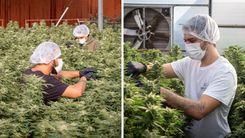Trump signs halt agreement to recriminalize hemp in the US; measure set to take effect after 365 days
New legislation redefines hemp and prohibits most broad-spectrum CBD products starting in 2026
Published on 11/14/2025

Canva Pro
President Donald Trump signed into law ending the longest U.S. government shutdown and, simultaneously, restoring the federal ban on most hemp-derived products. The measure, approved by the Senate on Monday and by the House on Wednesday, marks one of the largest drug policy reversals in decades in the United States.
The text, inserted in the government funding bill, redefines the legislation that regulates hemp and its derivatives. The main change is in the alteration of the hemp definition established by the 2018 Farm Bill, which now considers “total THC” — including THCA, delta-8 THC, and other isomers — as the legal parameter. Currently, the limit is restricted to delta-9 THC. This new metric will make various products and flowers available on the market since 2018 illegal.
Another key point is the establishment of a limit of 0.4 mg of total THC per package, regardless of the product type. The standard renders many broad-spectrum CBD products unviable and prohibits synthetic or manufactured cannabinoids, such as delta-8 THC produced from CBD.
During the 365-day transition period from the publication date, the FDA (Food and Drug Administration) will be responsible for defining labeling guidelines, laboratory testing, and the concept of “packaging” for enforcement purposes.
Faced with this scenario, companies and industry experts are adopting a cautious stance. “Our current position is one of strategic caution. It is premature to consider any action at this time. We are not facing a specific government act but rather an articulation that must be closely monitored”, states Christiani Di Risio, CEO of Earth Wellness.
The Society of Cannabis Clinicians (SCC) recommends that producers and consumers engage with their representatives, providing data on jobs, revenue, and therapeutic benefits related to hemp products.
According to Dr. Wilson Lessa, psychiatrist and vice president of AMBCANN (Brazilian Medical Association of Endocannabinology), the American debate should serve as a warning to Brazil. “This uncertainty about the future of hemp products in the US should at least sensitize Brazilian society to the need to strengthen patient associations and regulate cultivation and licenses for small family farmers in a cooperative model, as is being done in Morocco, to depend less and less on the political whims of other countries”, he states.








